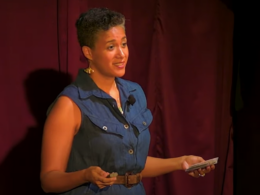by Deborah Kartheiser
*This is a special archive feature from our print magazine. This article ran in the March 2001 issue of Among Worlds magazine.
One of the biggest fights of our marriage started with a hardwood floor.
I loved our newly purchased old house but abhorred the matted carpet. One day I pulled up a corner and discovered worn, but intact, hardwood underneath. By the time my husband got home, I had de-carpeted an entire room singlehandedly and was plotting a stripping and refinishing strategy. He was horrified that I would embark on such a costly and complex project without consulting him.
I retorted that he just would have put it on a back burner — and nothing would have been done. He wondered why I had to rush headlong into things as if there were no tomorrow.
When we agreed to talk truce, we realized the floor itself was just a symbol of the fury and frustration we often felt when dealing with our incompatible approaches to decision making.
We also realized those approaches stemmed in part from our very different roots: mine as a missionary’s kid whose entire lifestyle presumed a “get it while you can” transience, and his, a deeply rooted childhood in the same ethnic neighborhood and Chicago bungalow where his father had grown up.
To this day, more than twenty-five years after leaving the mission field, I still deal with that “now or never” impulse in myself. It has become part of who I am — a sense of dire urgency that often seems inappropriate, but one which I cannot shake. If I don’t grasp the moment now, it will be too late.
My husband, on the other hand, likes to ponder, sleep on it a while, and then think about it again next month or next year. Maybe if we wait we can get a better deal, the timing will be more fortuitous, the thing will take care of itself.
After the hardwood-floor truce we were able to laugh together when he recalled the most weighty household decision from his childhood: whether to remove the swinging door that separated the kitchen from the hallway.
But I think that fight illustrates one of the many tensions that always will exist in our marriage because of where we come from.
Sure, all marriages have their tensions because we’re all different people. The very qualities that endear us to each other — his stability and frugality, my irreverence and nonconformism —also end up driving us nuts.
But some of the very basic building blocks (the who-we-are stuff) can build bewildering impasses in a daily relationship between a third culture kid and someone who has grown up monoculturally.
These clashes are all the more frustrating because so much of that who-we-are stuff seems all but invisible.
As TCKs, many of us are hidden immigrants from other cultures. So technically, many of us already live in cross-cultural marriages with all the attendant challenges.
But we also carry whole extra overlays that are hidden, including cynicism, arrogance, grief, and chameleon-like personas, which can drive our gut-level responses without our even knowing it. Even after so many years of marriage our monocultural spouses may be stunned and bewildered by our strange, unexpected responses, while we’re frustrated that they can’t understand something we can’t quite seem to explain.
Last summer, at a World Reunion 2000, author and adult TCK Ruth Van Reken said something that really opened my eyes in this regard — toward marriage and toward myself. (A deep thank-you, Ruth.)
“When pain is shut down, so is the capacity to feel or express joy. This response can be devastating to a marriage.”
If we find ourselves behaving or reacting in a way that seems irrational or inappropriate, she said, allow ourselves to take an honest look at the root of that behavior or reaction. Where did it come from? When did we feel like that before? To what was it originally a response?
With that approach, she said, it’s likely we’ll find a very logical source for that seemingly crazy hang-up. We can begin to examine the source rather than just living in frustration with the symptom.
A mid-1990s study by Ruth Hill Useem and Ann Baker Cottrell showed that while 80 percent of adult third culture kids do get married, and that our divorce rate is lower than the [U.S.] national average, a number of us continue to feel rootless, alienated and unable to make commitments to people or places.
Adult TCKs do tend to marry later. Fourty-one percent of the study’s respondents did not wed until after age twenty-five. And 60 percent married someone who had at least some international experience when they met.
We bring to these marriages the relational patterns we’ve learned, patterns that have come to be very useful through our lives of constant adapting and exploring and goodbyes, but which may not be as appropriate in a long-term intimate relationship.
Some of these that I see most mirrored in my own life are outlines in the “Relational Patterns” chapter of the book The Third Culture Kid Experience, by David Pollock and Ruth Van Reken.
One biggie: according to Van Reken’s independent research on adult TCKs (cited in the book), “40 percent of the respondents said they struggled with a fear of intimacy because of the fear of loss.”
I now realize that when I feel someone is detaching from me, I overreact. “Who needs you?” I rail subconsciously. “Get lost. I’ll be just fine on my own.” And the wall goes up — even against my spouse, after fifteen years of marriage.
It’s a common paradox that we TCKs can seem warm and engaging on one hand, and cold and distant on the other — a pattern sure to baffle one’s spouse and even oneself.
To make sense of this, it helps to review the levels of communication normally followed as people get to know each other, as outlined by Pollock and Van Reken: Level One, the superficial level, generally involving “small talk;” Level Two, a “still safe” level, an exchange of no-risk facts such as where you went on vacation; Level Three, the “judgmental” level, where we start expressing opinions about politics or religion or other matters where we might disagree; Level Four, the “emotional” level, in which we begin sharing how we feel about life and ourselves; and Level Five, the “disclosure” level, in which we reveal our most private thoughts and feelings with a vulnerability that leads to true intimacy.
“Even TCKs who are regarded as gregarious, open, and friendly because of their skill at jumping into the second and third levels of communication often refuse to move on to the fourth and fifth levels of true intimacy. They manage to erect wall, usually without realizing it, to keep out anyone trying to come closer,” write the authors.
Another relational pattern we TCKS often have learned is the “quick release”: when we sense someone is about to leave, we let go too soon. We may even use anger as a shield against the pain of separation. For example, by picking a fight with a spouse who is leaving for a business trip.
Even now, say the authors, “Some ATCKs who have commonly used anger themselves (or had it used by those they were separating from) as a shield against future pain may see any type of anger as a precursor to separation, and emotionally detach at the first sign of it.”
Another common response of TCKs to the multiple losses due to high mobility is emotional flattening, or refusing to feel the loss. This flat emotional response, say the authors, can be transferred from situations of farewell to all areas of life. “When pain is shut down, so is the capacity to feel or express joy. This response can be devastating to a marriage. The ATCK’s partner feels rejected because there are too few external demonstrations of love from the ATCK. Conversely, no matter how many romantic gestures are offered to the ATCK, nothing seems to spark a warm response.”
What’s more, because of a lack of long-term relational experience, we may misread what’s happening in our close relationships and react in ways that are inappropriate. I found this explained quite clearly by Elizabeth McCance Haddon in a repatriation guide for students at Canadian Academy, an international school in Japan: “You might pull away from the people . . . as soon as you feel them being even a tiny bit distant. You automatically assume that the relationship is over. People who haven’t had to deal with international living are often more able to realize that relationships go through lots of phases and might feel a bit more secure when things aren’t all perfect.”
Hindsight being what it is, I now can look back and see how these patterns affected my first marriage, as well as my second (current) one.
Not only does this invisible stuff affect the way we relate to each other, it may even have helped attract us to the person we married in the first place. I know that has been true for me.
When I met the man who was to be my first husband, I was a college student — uprooted from my homeland — and desperate to belong somewhere and with someone.
He was a couple of years older and came from a pillar-of-the-community rural family that had a gift for hospitality and had spent many years caring for foster children. He also planned to be a minister, which was a way of life I knew well. The marriage seemed to offer the ready-made security structure I believed I needed.
Looking back, of course, I realize I had no business placing that kind of demand on any relationship. Nobody could give me that security which I had not developed within myself. As with many young adult TCKs, I appeared outwardly mature but was developmentally delayed emotionally.
In my late twenties, I went through the delayed adolescence and rebellion that many of us have experienced. I didn’t understand what was happening, and although we did seek counseling, neither we nor our counselors even realized that TCK issues existed. I do remember being surprised when one counselor told us that our communication problems might stem from the fact that I was still “more Japanese than American.” But who knew what that entailed?
Then there was the issue of moving, which tends to go along with the ministry. I didn’t realize it at the time, but I carry a lot of “grief baggage” which is triggered by geographical moves. It really throws me off balance. My husband couldn’t understand why I couldn’t bounce back and be more supportive after a move. I felt as if he had cut off my legs and then ordered me to dance.
At about that time, I also forged relationships with women friends who helped me greatly along the road to self-esteem — to be who I was unapologetically rather than conforming to what other people wanted in order to gain acceptance. My husband could not understand what had happened to his formerly compliant, self-sacrificial wife.
All this was a death knell for our marriage.
I wasn’t sure I would marry again. But when I did — for companionship rather than security — it was to a man who had lived a geographically stable and monocultural childhood. He came from a highly urban background, a less conservative faith, and a career in journalism, which demands one remain adaptive and maintain an expanded world vision.
But again, that hidden stuff crops up.

The hardwood floor was just one small example. The moving thing has been a huge issue. (People in the journalism field probably move more often that ministers or missionaries. Funny I didn’t see that coming.)
What has really saved us, I think, is our discovery four years ago of the TCK profile and all that goes with it. Knowledge really can be power. Slowly, I’ve been able to dissect and make sens of that moving issue, for starters.
A turning point came two years ago, as my husband once again found himself without a job. It happens a lot in the news business, and it was assumed we would move again. But I found I had hit the wall. I just couldn’t do it. Had I been forced to uproot again at that point, I probably would not have been okay. I probably would have needed serious psychiatric care.
About the same time, I had a medical exam that turned up some nodules. My doctor was trying to determine if they were malignant. I remember hoping that they were, because maybe if I were dying, we wouldn’t have to move.
Because of my newfound TCK knowledge, I was able to impress the seriousness of the situation upon my monocultural husband, who loved traveling, living in different parts of the country, and most of all, his news career.
Although he couldn’t fully understand why, he could see that another uprooting was going to put me away. So he made the sacrifice, changing careers in his mid-forties to take a local job so I wouldn’t have to move again. We’re still living in that community. We’re not planning to move again anytime soon, although I know that if I gave the okay, he’d probably be glad to go.
That truce illustrates another thing I’m learning about being a TCK married to someone with a monocultural background: we’re not going to understand each other as deeply as we had first assumed. But we can be respectful and considerate, even of that which we don’t understand.
For a long time, I resented his lack of understanding of who I really am. I felt he simply wasn’t trying, didn’t want to know.
Now I realize he can’t. Just as I can’t truly understand the whole range of thinking, feeling, and behavior that would stem from spending one’s formative years in a setting where “we belong in this place” and “we belong with these people.”
At this point, that’s okay. Especially if we can keep that ability to laugh at our sometimes weird, sometimes infuriating, and always unique selves.
Deborah (Yoder) Kartheiser is an American TCK who grew up in Japan.












